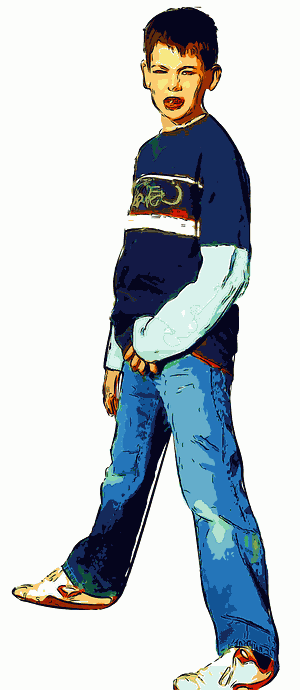source: www.youthwork-practice.com | 2000 Games, Devotions, Themes, Ideas and more for Youth Work
only for private using
The manipulated development
The manipulated child - unfree in its thoughts, in his judgment, in its development
“We never can empathize with a child. We do not try to think his thoughts; we subordinate ours to them.”
Jean-Jacques Rousseau: Emile or About Education
“To make a young person of sound mind, he must formulate his own judgments, rather than us imposing ours on them.”
Jean-Jacques Rousseau: Emile or About Education
Never try to make someone the way you are. You know it, and God knows as well that one of your kind is enough. "
Ralph Waldo Emerson (1803-1882), American essayist, poet and philosopher

Regarding education, the biggest problems are not
the children, but the educator.
© www.youthwork-practice.com
I would like to use these three quotes to highlight a problem about education. We, as parents, educators, teachers, and youth workers want to make the child an image of ourselves. It is supposed to think, act and behave just as we do. That may sound somewhat exaggerated, but when you think, you will notice that in one or the other case, that no longer is only wishful thinking.
Your own opinion was forced upon the child, youth or fellow human being. They were manipulated, influenced and brainwashed until they adopted these ideas of somebody else. In extreme cases, you can observe that very well with religious fanatics.
Each child learns at an early age to behave according to the adults around him, to adapt. Later, as an adult, you may then say, "man (namely you, but also I) has to function in a way just as society demands. Everything which does not comply with this image is considered wrong. At least now, you can use these three quotes for a self-reflection: How did I become the way I am? Are we truly free and happy? In judgments, in thought, in action? Who has manipulated us?
Let us return to the children and young people ....
-
If you want to patronize your children, you make them mindless beings, the underdog, cowards, people who cannot stand up for themselves.
-
We need children who are brave, which may sometimes make mistakes so that they can learn from their mistakes, children, which at times offend, but want to be loved at the same time.
-
The children need parents, teachers, educators, which have the patience, wisdom and foresight and let the children mature into independent personalities.
And how can this be done?
-
Give children and young people the necessary freedom (the so-called long leash!)
-
Show them empathy empathy, so that you can you empathize with the child and the young person (or so that they learn how to do it)
-
Show interest in each other (for the child, the youth, the students). The kids notice pretty quickly whether a teacher, educator, youth leader pays attention, listens and cares for him, or only himself and his subject matter, group program, or only wallows his ego.
-
You can and even should show children your point of view, explain all the pro and cons – but leave the choice to the child, the young person.
-
Let kids make their own experiences. They can learn from mistakes; they make them smarter. That is the only way to develop an own opinion, learning to live your life your way.
Regarding education, the biggest problems are not the children, but the educator. Some of my articles described the consequences, which may come from the behaviour of parents, educators, teachers and youth workers. And then they wonder, why the teenager has become the way he is. It was not the young person. It happened because of one or more parent, teacher, educator or youth leader.
[ © www.youthwork-practice.com | 2000 Games and Ideas for Youth Work ]






